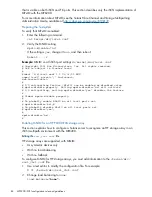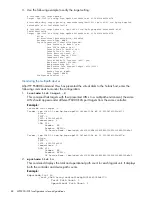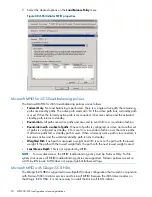
2.
Verify that SendTargets is enabled:
# iscsiadm list discovery
3.
The MPX200 has multiple iSCSI ports available to the Solaris iSCSI initiator. To discover the
targets available, enter the following command for each iSCSI port IP address that the iSCSI
initiator accesses:
#iscsiadm add discovery-address ‘iscsi port IP address’
4.
Verify the discovery address entries:
#iscsiadm list discovery-address
5.
After discovery addresses are entered, the Solaris iSCSI initiator polls each address for all
targets available. To list the targets available to the initiator, enter the following command:
#iscsiadm list target
Example:
#iscsiadm list target
Target: iqn.1986-03.com.hp:fcgw.mpx200.0834e00028.b2.01.50014380025c4179
Alias: -
TPGT: 0
ISID: 4000002a0000
Connections: 1
Target: iqn.1986-03.com.hp:fcgw.mpx200.0834e00028.b1.01.50014380025c417d
Alias: -
TPGT: 0
ISID: 4000002a0000
Connections: 1
NOTE:
The iSCSI initiator must discover all targets presented by each MPX200 iSCSI port
that will be used in a multipath configuration.
6.
Create the iSCSI device links for the local system:
# devfsadm -i iscsi
Modifying the target parameter
MaxRecvDataSegLen
Sun recommends that you set the
MaxRecvDataSegLen
parameter to 65,536 bytes for each
iSCSI discovered target. For more information, see
http://wikis.sun.com/display/StorageDev/
iSCSI+Fto+RFC+3720+Parameters
.
To modify the target parameter
MaxRecvDataSegLen
:
1.
List all iSCSI targets:
#iscsiadm list target-param
2.
Change the value of
MaxRecvDataSegLen
to
65536
for each target:
#iscsiadm modify target-param -p maxrecvdataseglen=65536 ‘target
iqn’
Setting up the iSCSI initiator
87
















































